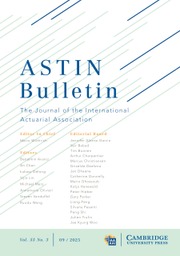Article contents
On automobile insurance ratemaking
Published online by Cambridge University Press: 29 August 2014
Extract
Suppose that an automobile insurance plan is characterized by a double classification. The risks are thus divided into classes, i = 1, 2, …, p (e.g. defined by use of car and age of operator), and groups j = 1, 2, …, q (e.g. defined by licence and by accidents during the last three years). The experience of the company is described by the observed “relative loss ratios” rij and some measure of exposure nij. A general model, often used, is that the rij: s are observations of random variables with the expected values gij = g(αi, βj), where the relativities αi are parameters representing the classes i and the relativities βj represent the influence of the groups j. One of the ratemaker's problems is to find a realistic function g(α, β) and to obtain estimates ai of αi and bj of βj.
In their paper “Two Studies in Automobile Insurance Rate-making” (ASTIN Bulletin Vol. I, Part IV, page 192-217) Robert Bailey and LeRoy Simon have thoroughly analyzed this problem for private passenger automobiles in Canada. They have principally studied three different types of the function g(α β), namely g(α β) = αβ (Method 2), g(α β) = α + β (Method 3) and g(α β) = 3αβ— 2 (Method 4). The authors show in an appendix, that the variance of rij is approximately g(αi βj)/Knij where K ≅ 0.005 for the Canadian data. They estimate the relativities αi and βj; by making χ2 = K. Σnij(rij — gij)2/gija minimum. For the Canadian material, the “method 4” agrees best with the observations. This method gives an observed χ2 value of about 8 for 11 degrees of freedom.
Information
- Type
- Astin Colloquium 1966 Arnhem Subject one
- Information
- Copyright
- Copyright © International Actuarial Association 1968
References
- 25
- Cited by

